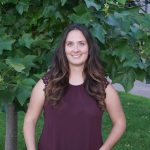
Alumni Member
Anja Bilandzic
What additional degrees or training do you have?
I have a HBSc from the University of Toronto, specializing in Global Health.
How did you become interested in your field?
I was always interested in science, but as I went through my undergrad, I knew I ultimately wanted to focus on incorporating this passion with a social science lens. After taking a few epidemiology courses and volunteering in a research team, I knew that this was a great fit for me. More broadly, the public health field appeals to me because of the focus on far-reaching and upstream determinants of health. It is complex, there are many moving parts, and that makes it a challenging and exciting area to work in.
Tell us about interesting projects you are working on.
One of my team’s main focuses in the past year has been on effectively communicating information to a range of audiences. We have been learning a lot about data visualization theory and best practices, and are designing different information products in-house based on these principles and on stakeholder feedback. We have revised current products and are looking at different platforms to provide interactive visuals with narratives in the future.
What do you enjoy most about your current career position?
My favourite part of my current position is interacting with members of Indigenous communities who use data for decision making. It is very rewarding to listen and get a better understanding of the context behind the information, and learn how different types of evidence impact ongoing community health work. Working at the federal level can sometimes feel detached from the people you are working with, but this gives me an opportunity to remain engaged and focused in my work.
I also enjoy that I have the opportunity to work with a broad range of health professionals and planners. In my role, I work horizontally to support a diverse range of program staff, which has allowed me to gain knowledge in areas I would have never expected – like dentistry and water sampling.
In what ways has your experience at DLSPH had an impact on your career and who you are today?
At the School, in parallel to my core epidemiology training, I was exposed to a wide range of courses and topics which gave me new perspectives on emerging issues, particularly in the policy and communication domains. This experience widened the scope of my public health knowledge base and encouraged me to keep an open mind, to continue learning and hearing different viewpoints which I may not be considering right away from looking only at the numbers.
How did your experiences at the School help you to overcome obstacles you’ve faced as a public health professional?
At the School, I had the opportunity to develop my collaborative skills by working with a wide range of health professionals on joint projects. This has been incredibly helpful in my career, where I often work in groups with diverse team members. Learning to effectively communicate and utilize everyone’s strengths is key.
What advice would you give to younger alumni or current students who aspire to follow a similar career path?
I would encourage anyone to try new things and to embrace experiences that you aren’t automatically comfortable with. I have found that the most positive experiences I have had are the ones that challenged me the most – whether that was in school or in a job. If something seems scary at first, it will probably be incredibly beneficial to you in terms of learning new skills, increasing your personal growth and making new networks.
What would you say to a prospective student who is considering the School?
DLSPH is a wonderful place to explore your interests and gain a strong foundation in your public health area of choice. The network you can make here is outstanding in terms of faculty and public health practitioners, but your richest relationships will likely come from fellow students. You will go on and enter the public health sphere together and keep learning from each other for years to come – so take advantage!